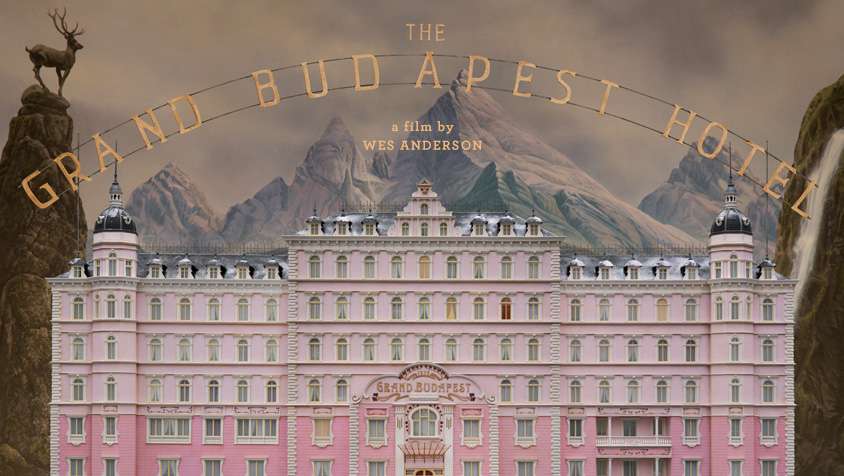The central characters in Wes Anderson’s films have always had a deep and inextricable connection to the places they love: Max Fischer had Rushmore; Royal Tenenbaum had the house on Archer Avenue; Steve Zissou had his ship, the Belafonte. Despite their usually roguish natures, these connections hint at some kind of deep sadness and longing beneath their charismatic façades. For them, these places are more than houses and boats and boarding schools—they represent something friendly and welcoming. They know that the world can be a cruel, cruel place and all they can really ask for from life is somewhere to call home—a sanctuary. For M. Gustave (Ralph Fiennes) of Anderson’s remarkable new film, the titular location of The Grand Budapest Hotel is just that.
Largely set in the fictional Eastern European country of Zubrowka, the film uses four distinct timelines, each filmed in a different aspect ratio and colour palate precisely layered together. The first takes place in present day, and features a young girl walking through a garden to reach the tomb of an accomplished writer. Next is a flashback, in which the the writer talks directly to the audience about a time in the past when he visited the hotel. The third follows him in the 1960s, a young man at the time, through the hotel—a fading relic of a once vibrant and glorious past. There, he meets owner Zero Moustafa (F. Murray Abraham), who tells him of the hotel’s history and the hyper-competent concierge, Gustave, who is its main attraction. The final and longest timeline picks up in 1932 and follows Gustave and Zero, now an inexperienced lobby boy, as Gustave inherits a priceless renaissance-era painting after an elderly socialite with whom he was sleeping is murdered under mysterious circumstances. What follows is a deft blend of genres—caper, murder mystery, prison break, and screwball comedy being the most recognizable.
At the centre of the story is M. Gustave, a typical Andersonian hero. He’s witty, gregarious, and empathetic. He is also, for lack of a better word, quirky: he recites romantic poetry to his employees, wears a liberal amount of perfume, and has a near god-like ability to anticipate the needs of his guests. What sets him apart from other Anderson characters, however, is his edge: he drinks, gets into fights, and relishes in the use of well-delivered profanity. In turn, this makes his sympathetic qualities stand out much more. He, above all else, understands that the unkindness of people comes from fear or institutional obligation rather than hatred. He is portrayed brilliantly by Fiennes, who attaches a human sadness to this incredibly touching role, while seeming to have the most fun of his career.
Filling out the rest of the cast is the usual cavalcade of Anderson actors—Bill Murray, Jason Schwartzman, and Owen Wilson all get minor roles—and seemingly every established character actor alive, including Willem Dafoe, Jeff Goldblum, Tilda Swinton—in spectacular old-age makeup—and Tom Wilkinson to name just a few. Deserving special attention is newcomer Tony Revolori as Zero. He brings a nervous energy to the film that works as a counterpoint to Gustave’s ever-composed nature.
The film also features some of Anderson’s most experimental camera-work. He moves the camera beyond his usual whip-pans and tracking shots to create some of the most dazzling, empathetic filmmaking I’ve seen in recent memory. One particular standout shot features Zero’s love interest, Agatha, looking directly at the camera with swirling lights around her head, representing the dizzying high of young love. He also uses his common techniques to great effect: every shot is beautifully and meticulously composed, and the script supplies a steady stream of locations for him to showcase his talent – a museum, a mansion, a prison, and especially, the hotel—all rendered in a high level of minute detail and shot in a distinct cinematographic style.
The Grand Budapest Hotel is a fun romp with a complex, emotional centre and is not to be missed.
The Grand Budapest Hotel is running at Cinema du Parc (3575 Parc) between 1-9 p.m. until April 3. Student tickets are $8.50.









